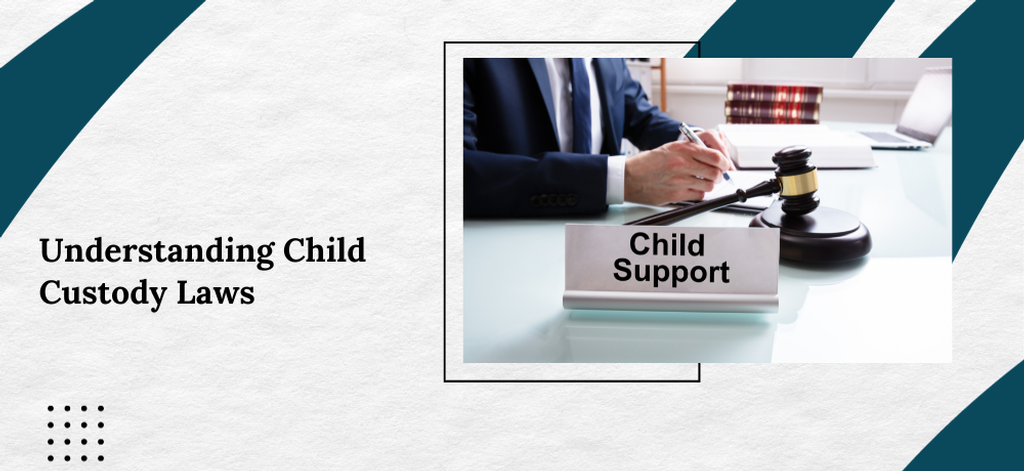Understanding Child Custody Laws

Child custody can be one of the most emotionally charged aspects of family law. If you're a parent and facing custody issues, you're not alone. Understanding child custody laws is essential for parents going through divorce or separation, as these laws establish the framework for determining where and with whom a child will live and how important decisions regarding their upbringing will be made.
Child custody laws vary from province to province and can be complex, making it crucial for parents to understand the principles involved. These laws are designed to prioritize the child's best interests, and understanding their intricacies can help parents navigate the legal system more effectively, whether they are seeking custody or involved in a dispute over custody arrangements. In this guide, we will delve into the fundamental aspects of child custody laws, shedding light on key concepts and considerations that can empower parents to make informed decisions and work towards custody arrangements that benefit their child.
Types of Child Custody
Child custody isn't one-size-fits-all. There are different types, including physical, legal, joint, and sole custody. Each has its implications and considerations. Child custody arrangements typically come in two primary types: physical and legal. Physical custody determines where the child lives and spends their time. In sole physical custody, the child primarily resides with one parent, while the other may have visitation rights. Joint physical custody means the child splits their time between both parents' homes.
Legal custody, on the other hand, pertains to decision-making authority regarding the child's upbringing. Sole legal custody grants one parent the sole right to make important decisions for the child, such as those related to education, healthcare, and religion. Joint legal custody allows both parents to share these decision-making responsibilities, requiring them to collaborate on major choices in the child's life. Custody arrangements can vary widely, and their specific terms can be determined through court orders or mutual agreements between parents.
Determining Child Custody
The court determines child custody arrangements with a focus on the best interests of the child. Factors such as parental fitness, child's preference, and stability are considered.
Determining child custody is a complex process that involves considering several factors to ensure the child's best interests are met. Courts typically prioritize the child's well-being above all else when making custody decisions. Factors that influence custody determinations may include the child's age, physical and emotional needs, the parent's ability to provide a stable and loving environment, any history of abuse or neglect, and the child's established routines and relationships.
Courts may also consider each parent's willingness and ability to cooperate and communicate effectively with one another for the benefit of the child. In many cases, courts encourage joint custody arrangements that allow both parents to remain involved in the child's life as long as it is deemed suitable for the child's overall welfare. Ultimately, the specifics of child custody determinations can vary from case to case and may be influenced by provincial laws and the family's unique circumstances.
Child Custody Modifications
Child custody agreements can be modified if circumstances change. Discover the circumstances under which modifications can be sought and how to navigate this process.
Child custody arrangements are not set in stone and can be modified when circumstances change. To seek a child custody modification, a parent typically needs to demonstrate a significant change in circumstances that affects the child's well-being. Examples of such changes could include a parent's relocation, changes in a parent's work schedule, the child's evolving needs, or evidence of a parent's inability to provide a safe and stable environment. It's crucial to note that courts always prioritize the child's best interests when considering custody modifications and will assess whether the proposed changes will better serve the child's overall welfare.
Parents can usually initiate the modification process by filing a court petition outlining the reasons for the requested change. If both parents agree to the modification, the court's approval may be more straightforward. However, if there is disagreement between the parents, the court will review the case, possibly involving mediation or a custody evaluation, to make an informed decision in the child's best interests. It's advisable to consult with an attorney experienced in family law when considering or navigating child custody modifications to ensure the best possible outcome for both the child and the parents involved.
The Role of a Child Custody Lawyer
A child custody lawyer plays a pivotal role in helping parents navigate the complexities of child custody disputes and legal proceedings. These attorneys are well-versed in family law and specialize in advocating for their client's rights and the child's best interests. Their primary role is to provide legal counsel and representation to parents involved in custody cases, guiding them through the legal process and helping them make informed decisions.
Child custody lawyers assist their clients in various ways, including negotiating custody arrangements, drafting custody agreements, and representing their clients in court if a resolution cannot be reached through negotiations. They help gather evidence, present compelling arguments, and advocate for their client's position regarding custody and visitation rights. Additionally, child custody lawyers can offer emotional support and guidance during what can be a highly emotional and stressful process, ultimately working towards achieving a custody arrangement that serves the child's best interests.
Navigating child custody laws can be overwhelming, but it's essential for your child's well-being. Law Office of Gary Vlug is here to support you through this challenging time. Contact us for expert advice and representation.
If you're looking for a trusted child custody lawyer in Vancouver, BC, who can help you understand and navigate child custody laws, contact the Law Office of Gary Vlug today. We're here to protect your child's best interests.
To learn more about the services we offer, please click here. To contact us, please click here or call us at (604)323-8586.